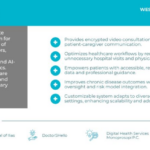In the new era of telecare at home, tech-trained nurses play an essential role in bridging the gap between healthcare technology and patient care. As telemedicine systems like CAREPOI become more widespread, these nurses bring a unique skill set that allows them to effectively use digital health tools, deliver remote patient care, and provide invaluable support in a technology-enabled healthcare environment. Their expertise ensures that patients receive high-quality, continuous care, regardless of location.
How can “Telenursing” program benefit nurses employing telecare and AI technologies:
1. Delivering Remote Patient Monitoring and Care
Tech-trained nurses use telemedicine systems like CAREPOI to monitor patients’ health data in real time, ensuring that changes in a patient’s condition are detected early. This includes reviewing metrics such as vital signs, blood pressure, glucose levels, or other condition-specific indicators, which can be transmitted from wearable devices or home monitoring equipment to the CAREPOI platform. Nurses then assess this data and respond as needed, whether by providing health advice, adjusting care plans, or alerting physicians when intervention is necessary.
2. Supporting Patient Education and Empowerment
With telemedicine, patients often play a more active role in managing their health. Tech-trained nurses provide essential guidance on using devices and interpreting health data, empowering patients to monitor and understand their own health metrics. This is particularly important for chronic disease management, where patients with conditions such as diabetes, hypertension, or COPD benefit from understanding how lifestyle choices affect their health.
By coaching patients on device use, explaining readings, and offering lifestyle advice remotely, tech-trained nurses build patients’ confidence in managing their conditions and reduce the need for frequent in-person visits.
3. Enhancing Telehealth Consultation Experiences
During virtual consultations, nurses assist patients and healthcare providers by ensuring that the technology functions smoothly and that both parties are comfortable with the telemedicine platform. They prepare patients for consultations, document interactions, and manage follow-up tasks to streamline the telecare process. This support not only improves the efficiency of teleconsultations but also ensures a more patient-centered experience, as nurses can personalize the encounter based on the patient’s needs.
4. Facilitating Medication Management and Adherence
Ensuring that patients adhere to their medication regimens is a critical role for tech-trained nurses in telecare settings. Using tools within platforms like CAREPOI, nurses can set up medication reminders, monitor adherence, and track side effects reported by patients. When patients face challenges in managing medications, such as remembering doses or dealing with side effects, tech-trained nurses provide remote support to address these issues.
5. Managing and Securing Patient Data
Telecare involves sensitive health data that must be protected to comply with regulations like GDPR and HIPAA. Tech-trained nurses understand the importance of data privacy and security, playing a role in safeguarding patient information and educating patients about best practices in telecare. They ensure that patients are informed about privacy policies, secure usage of devices, and maintain confidentiality throughout the telehealth interaction.
6. Collaborating with Interdisciplinary Teams Remotely
In a telecare model, nurses frequently coordinate with other healthcare providers remotely. Using CAREPOI, they can share relevant patient data, update care plans, and communicate with physicians, therapists, and specialists. This teamwork is vital to providing cohesive, high-quality care and ensuring that all providers have access to up-to-date patient information, enabling them to make informed clinical decisions.
7. Proactive Health Management and Preventative Care
Beyond managing acute or chronic conditions, tech-trained nurses play a proactive role in health promotion and disease prevention. By regularly reviewing patient data and using CAREPOI’s data analytics tools, nurses can detect early signs of health issues, identify trends, and offer preventative advice. This proactive approach helps reduce the incidence of emergency situations, prevent worsening conditions, and encourages healthier lifestyles for patients at home.
8. Enhancing Accessibility and Reducing Barriers to Care
One of the biggest benefits of telemedicine is accessibility. Tech-trained nurses extend healthcare services to patients in rural or underserved areas, allowing them to receive high-quality care without the need to travel long distances. For patients with mobility limitations or other barriers to in-person visits, these nurses are key in making healthcare accessible, helping patients navigate telecare tools, and fostering inclusivity in healthcare delivery.
9. Supporting Mental and Emotional Well-being
Telecare at home can sometimes feel impersonal, so tech-trained nurses play an essential role in preserving the human aspect of care. They provide emotional support through digital channels, checking in regularly on patients’ mental health and emotional well-being, and ensuring that patients feel heard and valued. For those with mental health conditions or social isolation, nurses become an important source of connection and support.
10. Contributing to Data-Driven Healthcare Insights
Nurses skilled in using telemedicine platforms like CAREPOI are integral in collecting, interpreting, and using patient data to improve healthcare outcomes. By identifying patterns and reporting trends, they contribute to healthcare insights that can drive the development of better practices, refine care protocols, and improve overall patient outcomes.







